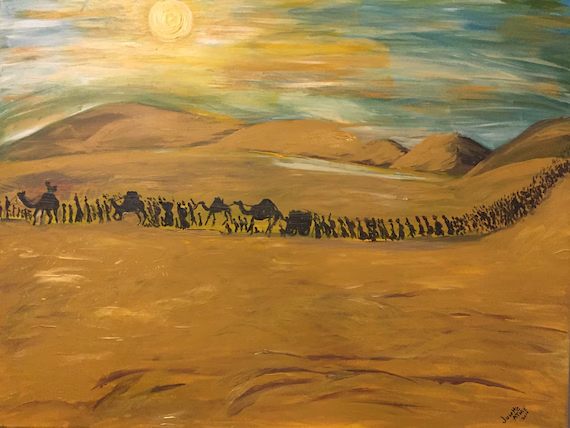Sermon on the Mountain
Everywhere Jesus went with his disciples, people gathered around him to hear his teachings.
On the Sabbath he spoke to them in the synagogues, but on other days he spoke to them outdoors, as the weather was mostly hot and dry.
One day, he walked a little way up a mountain. The people sat down on the ground so they could see and hear him.
Jesus told them that those people who were really hungry, to know God, would be satisfied.
He said they should be content with what they had, and not to worry about food, clothing or money.
You think that rich people are happy because they have everything they want. but you are wrong. Only those who love God will have everything.
Those of you who are poor will have riches in Heaven. Those of you who are sad will be happy in God's kingdom.
For those of you who have been hated and despised because you are my friends. there is a great reward waiting for you in Heaven.
'Don't try to save up lots of money: someone will only steal it. Other things you might hoard will only rust and rot away.
Store up your treasure with God, where no one can rob you of it. You can't spend your life trying to become rich, and do want God wants. You can only do one or the other.
'Look at the birds, he said. 'They don't grow and store food, but God takes care of them, and He will take care of you. Look at the beautiful flowers.
They don't make their clothes but not even the great King Solomon was better or more brightly dressed than they are.
Don't worry about the future and what might or might not happen. Do what God wants you to do. Trust Him. And He will give you what you need.
'You have the laws of God, and I haven't come to change them. The law says that you mustn't kill anyone, but if you think murderous thoughts about someone, that is as bad as killing.
You may want revenge for a wrong someone has done you, to pay back what you have received.
But God wants you to love your enemies, to repay a wrong with kindness. It is not easy to follow God's path, but you must start on the journey.
'Don't hide your good qualities, but let them shine out in your lives. You are like lamps. No one lights a lamp and puts it under a bowl.
They place it where it lights up a dark house. When people see the good things you do. they will thank God.
'It's easy to love your family and your friends, but you should love all people, even those who hate you and want to harm you.
When you do someone a good turn, don't tell everybody about it. Keep it a secret. God will see you and He will reward you.
When you pray to God, don't make a great, noisy display of it. Do it quietly when you are alone.
Talk to God as you would to a father who loves you.
Don't make your prayers long to show off or use meaningless words. God hears you and knows what you need.
'When you talk to God, say this prayer to Him:
Our Father who is in Heaven
Holy is Your name.
May Your Kingdom come.
May Your will be done on earth as it is in Heaven.
Give us our food each day.
Forgive us the wrong things we have done
As we forgive the wrongs others have done to us.
Do not let us be tempted to do wrong. But save us from evil.
'Anyone who listens to me, said Jesus, and does what I say, is like a man who builds a house on a rock.
When it rains, the wind blows and the floods come, his house will stand strong and firm.
But anyone who listens to me and doesn't do what I say is like a man who builds his house on the sand.
When it rains, the wind blows, and the floods come, his house will be washed away because it was built, not on solid rock, but on soft sand.
This is the message for all the people in the world, and you must go and tell them this.










Comments
Post a Comment